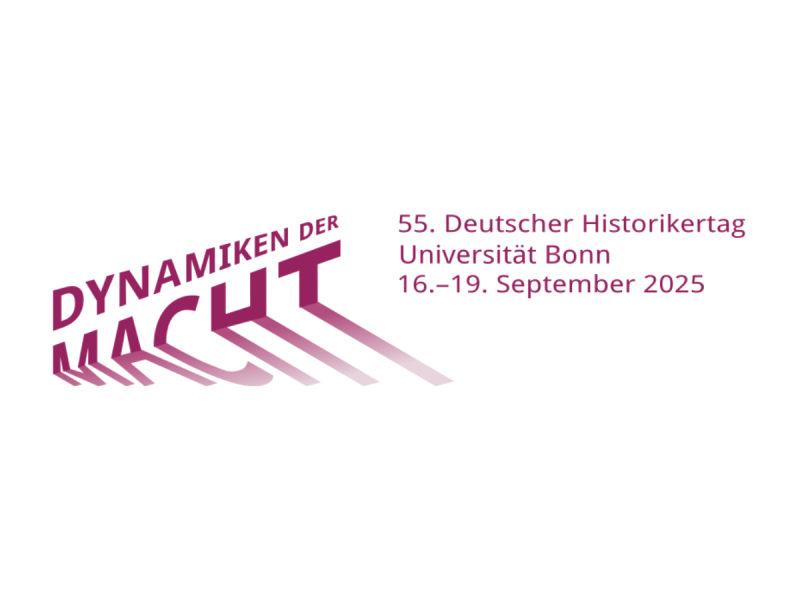“Shared Power? Traditional Hermeneutics and Digital Methods in Dialogue”
Section led by Joëlle Weis, Marina Lemaire, Jörg Wettlaufer as part of the 55th German Historians’ Convention

Date:
16.09.2025Place:
Bonn University
Festsaal
4 p.m. – 5.40 p.m.
Categories:
EventContact:
Dr. Joëlle WeisShared Power? Traditional Hermeneutics and Digital Methods in Dialogue
Joëlle Weis, Marina Lemaire, Jörg Wettlaufer (Section Chairs)
Digitality shapes large parts of our everyday lives, yet for many historians, the application of digital methods to generate new historical insights remains a distant goal—if not entirely terra incognita. Some rightly ask which digital methods they could or should use, what kind of new knowledge they might expect, and how such methods could be meaningfully integrated into existing research practices. Others question the potential of digital approaches, perhaps out of reluctance—or as a way to avoid deeper engagement with the topic.
This section aims to place traditional hermeneutic approaches in a dialogical relationship with digital methods in order to clearly identify both opportunities and challenges and to empower researchers to engage with digital technologies. It emphasizes the “shared power” of traditional hermeneutics and digital methods and addresses the questions: “How do I arrive at new historical insights? What role can digital tools and methods play in this process?”
To reflect a diversity of perspectives, the section departs from the conventional format of three speakers and instead features five short impulse presentations (50 minutes total). These will present digital methods explicitly as part of research processes driven by the pursuit of knowledge, highlighting both their added value and possible challenges. The talks will explore how history can be enriched through digital methods while remaining closely linked to empirical questions. In this way, the discussion of methods will be firmly anchored in empirical research practice.
Following the presentations, a 40-minute plenary discussion will explore the added value of digital methods for historical knowledge generation and how new tools can be integrated into the validation and interpretation of historical knowledge.
Using Digital Methods in Historical Research: What, How, and Where?
Werner Scheltjens (Bamberg)
This talk presents a capability-oriented framework for analyzing digital tools in the field of history. It categorizes software applications, compares them with traditional methods, and assesses their impact on the research process. The model includes the phases of input, transformation, and output, and emphasizes the importance of digital literacy, data logistics, and data resilience.
Discourse Analysis in Digital Transformation:
Scalable Reading to Explore the Political Culture of the Weimar Republic
Christian Wachter (Bielefeld)
This talk illustrates how word frequency analysis and topic modeling open up new avenues for analyzing large newspaper corpora, offering deeper insights into the democratic discourse of various actors in the Weimar Republic. It highlights both the potential and the challenges of the research project.
Historical Data in Digital Space:
Using Databases as Heuristic Tools
Laura Maria Niewöhner (Bielefeld)
Databases can be understood as digital filing cabinets: they store and link information, and depending on their structure, allow for diverse forms of analysis. Using the example of denazification, the talk demonstrates how historical data can be recorded and translated into digital formats to address scholarly research questions.
Between Innovation and Interpretation:
Digital Sentiment Analysis
Anselm Küsters (Berlin)
This talk examines the use of digital sentiment analysis in historical research. Through case studies on Reichstag speeches and the Luddites, it critically reflects on the potential of quantifying or even reconstructing past emotions. While lexical approaches are prone to error, large language models offer new perspectives—alongside methodological concerns such as overinterpretation and bias.
Modeling Historiography:
Digital Methods for Analyzing Historical Scholarly Communication on the Web
Melanie Althage (Berlin)
Taking the example of the scholarly communication platform H-Soz-Kult and other inherently digital sources, this talk—offered from a method-critical perspective—demonstrates how topic modeling and technologies like large language models can be used to gain insights into the themes, trends, and debates of recent historiography.
55th German Historians’ Convention
The Association of Historians of Germany (VHD) and the local committee are eagerly looking forward to the next Historians’ Convention, which will be held in Bonn from September 16 to 19, 2025. The Historians’ Convention is the largest platform for German-speaking historical scholarship. It reflects the diversity and international interconnectedness of contemporary historical research. The main theme of the convention will be “Dynamics of Power.”
The Historians’ Convention has served as the central forum for historical scholarship in Germany for over 130 years. Today, it is one of the largest humanities conferences in Europe, attracting around 2,500 participants from Germany and abroad. Its goals are to present current historical research to the public, discuss the pressing concerns of historians, and foster both academic and social exchange. More than 70 academic sections and numerous other events will focus on current topics across all fields of historical work.
The 55th German Historians’ Convention is organized by the Association of Historians of Germany (VHD) and the local committee at the University of Bonn, in cooperation with the German Association of History Teachers (VGD).

